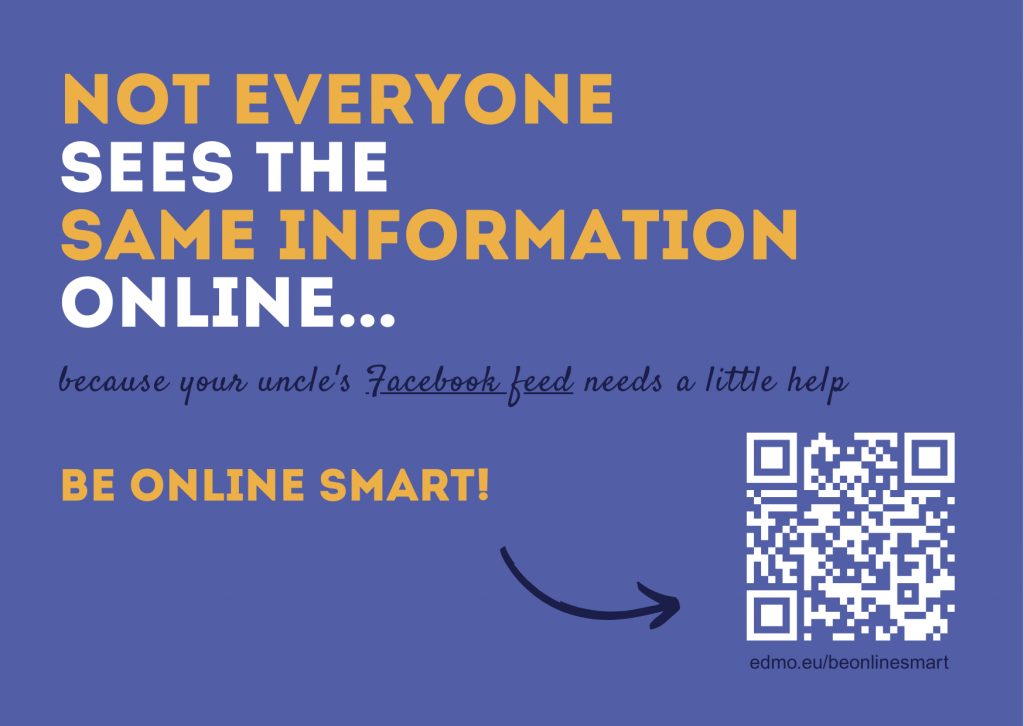Be Online Smart
Be Online Smart is a campaign by the European Digital Media Observatory (EDMO) and its network of 14 national hubs. It aims to raise awareness about how recommendation algorithms shape our online experience — from the news we read to the videos we watch.

Recommendation systems help us discover content we enjoy, but they can also limit what we see, amplify disinformation and extremism, and reinforce bias.
A DCU study has shown that social media algorithms rapidly push misogynistic and male supremacist content to users — often within minutes. Researchers created fake male accounts on YouTube Shorts and TikTok, and found they were quickly flooded with anti-feminist and extremist material, even without searching for it.
The findings have fuelled growing calls for stricter regulation of recommendation systems, with new research from ICCL and Uplift showing that 74% of the Irish public want tougher controls. ICCL has also criticised Ireland’s national disinformation strategy for ignoring the role of these powerful algorithms.
Media literacy alone can’t fix the problems of digital technology, but knowing how recommendation algorithms work is key to taking control online and joining the debate. The more we understand how algorithms shape what we see, the better we can spot misinformation, make informed choices, and stay in charge of our digital lives.
Understanding recommendation algorithms
An algorithm is a set of instructions that tells a computer how to complete a task — the basic building blocks behind everything from apps to websites. The internet runs on algorithms: they filter spam in your email, rank results on Google, decide what posts you see on Instagram or TikTok, and shape the ads and products shown to you online.
But many of these algorithms are proprietary, meaning we don’t know exactly how they work or what they prioritise — even though they influence what we see, think about, and buy every day.
Recommendation algorithms track what you do online and use that information to keep you engaged. Recommendation algorithms can be useful because they help us discover content we might like such as suggesting a new video, product, or playlist based on our interests or past activity. They save time and personalise our online experience.
But they’re also problematic because they often prioritise content that is sensational, emotional, or polarising rather than what’s most accurate or helpful. On top of that, platforms can insert content they want you to see, including ads or sponsored posts paid for by others. So what shows up in your feed isn’t always what you chose — it’s often what someone else wants you to see.
These algorithms lack transparency, so we don’t know exactly how they work or why certain posts are shown to us. This can lead to misinformation, reinforce bias, and limit the diversity of information we see.
So what can you do?
STOP
Don’t believe something just because it’s going viral.
THINK
Read the whole story rather than just looking at the headlines on social media
Remember that algorithms are often programmed to show you content you want to see.
Question the algorithm: think about what is being represented, and what is being left out
CHECK
Look for multiple sources and learn to find ones you trust.
LEARN
Learn more about how algorithms work (and don’t work)
Some suggestions:
- The Secret Rules of Modern Living: Algorithms. It’s got a great explanation of how Google’s ranking algorithm works – watch the clip here.
- The Social Dilemma – Bonus Clip: The Discrimination Dilemma. Algorithms are built on bias. “They don’t predict the future. They cause the future.”
- The European Centre for Algorithmic Transparency studies the impact of algorithmic systems used by online platforms and search engines.
- Netflix explains how its recommendation system works
